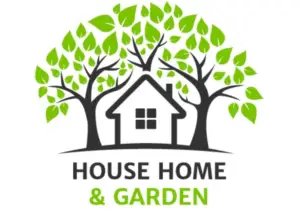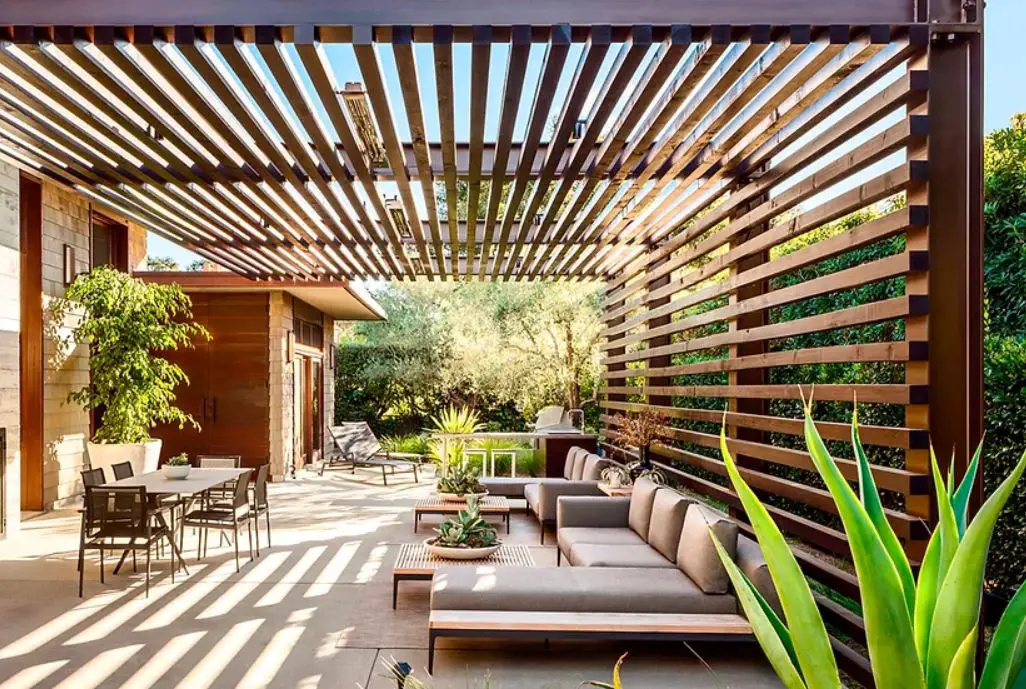Disadvantages Of Pergolas And Common Problems – Are They Worth Buying
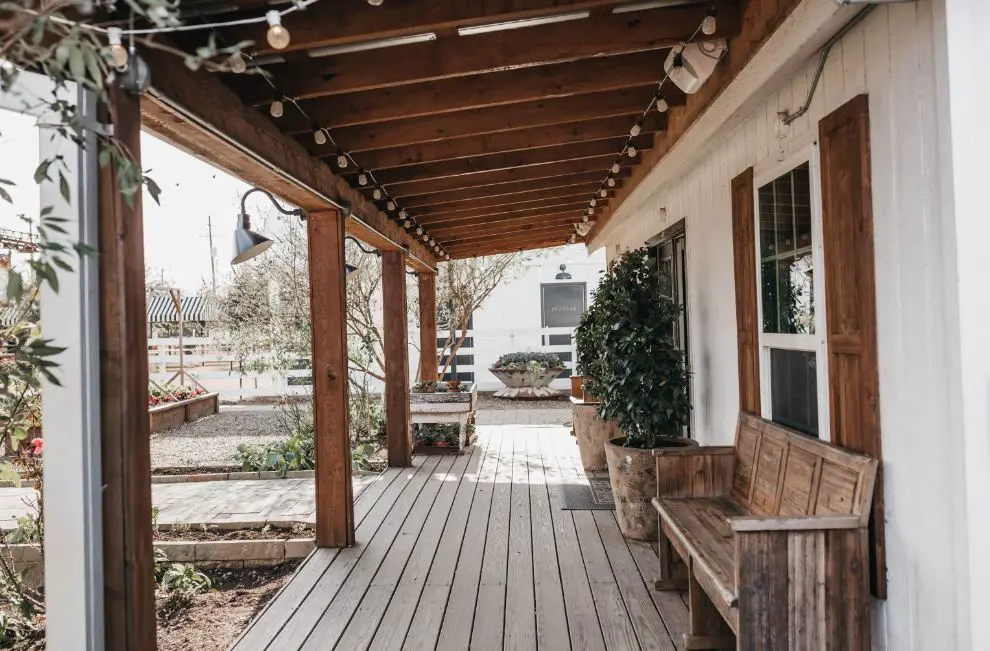
If you are looking to add something special to your outside living area or your garden then a pergola might be the way to go.
These structures are growing in popularity and there is a lot of talk about their benefits, but what about their disadvantages and common problems?
We will be looking at everything there is to know about pergolas so that you can decide for yourself if they are worth buying.
Intro To What Pergolas Are And Are Why Their Useful
Pergolas can be amazing additions to any outdoor area or garden if they are done correctly. They are frame structures that offer some sun protection while still giving an open-air atmosphere. They are great for creating a gathering space or beautifying a garden.
List Of The Disadvantages
There are quite a few disadvantages to pergolas that need to be considered. It includes:
- Pergolas Require Ongoing Maintenance
- Your Pergola Might Warp And Crack Over Time
- Short Lifespan
- May Be Destroyed By Bad Weather
- Alternatives May Be More Appropriate
- Termites & Insects
- May Not Increase Property Value
- Plant & Weed Problems
- Limited Weather Protection
- Pergolas Fade
- They Need A Large Space To Install
- Weight Can Be A Problem
What Are Pergolas
As described by Apartment Therapy, a pergola is an exterior structure that is held up by columns. These columns can be freestanding or they can be attached to the main house. The roof part consists of only beams and it is not covered. This design offers some sun protection without losing the open and airy feeling.
What Are The Different Types Of Pergolas
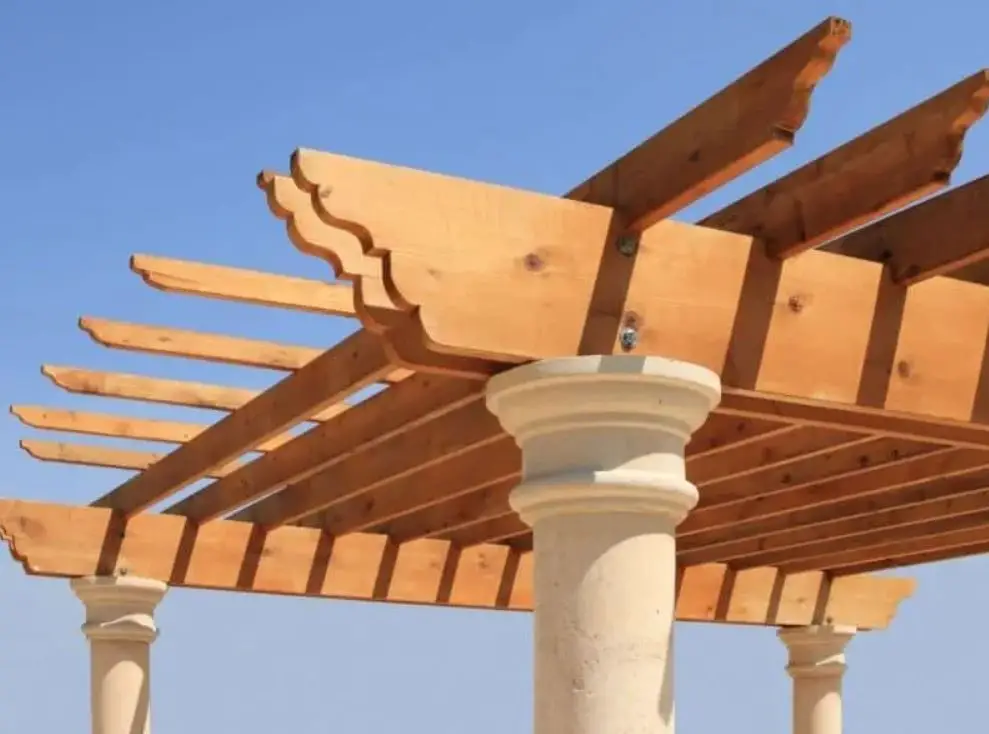
There are a few different types of pergolas that either differ in their design, structure or function. The first distinction is between freestanding pergolas and pergolas which are attached to the main house.
You also get flat roof pergolas or arched roof pergolas. And you also get open-aired pergolas or covered pergolas that might have a roof or plastic side covers.
Quick Facts Overview
The basic facts of a pergola are the following:
- They can be freestanding or attached
- They can be covered or open
- They can be DIY or professionally built
- They can be made from wood, steel, or fibreglass
- Their benefits include beautification, value addition, and weather protection
- Their disadvantages include maintenance, limited protection, and short lifespans
Disadvantages Of Pergolas
As with anything, there will be advantages and disadvantages. The disadvantages of pergolas should be carefully considered before deciding to install one.
Pergolas Require Ongoing Maintenance
Pergolas get a lot of weather exposure and depending on the material you use to build your pergola, it might need more or less maintenance, but it will definitely require some level of care otherwise it will start to look weathered. You will need to clean it and when using wood you have to treat it and paint it regularly.
Your Pergola Might Warp And Crack Over Time
Especially when using wood, you have the danger of your pergola warping and cracking over time. As the wood is exposed to the elements – the sun, the rain, and the wind – it will get weathered. The type of wood you use is also a big factor, some wood will last longer than others.
Short Lifespan
Pergolas can potentially have a relatively short lifespan which makes the cash investment less beneficial. Of course, it does depend on the type of pergola.
If you use wood it will have a much shorter lifespan compared to if you use fibreglass which is another popular material to use. Even then, fibreglass also has a limited lifespan due to all the elemental exposure.
May Be Destroyed By Bad Weather
Strong weather is bound to come around no matter where you are located. Strong winds and heavy rains can do serious damage to pergolas. They can crack the wood/fibreglass, or they can even snap the materials or break the foundation causing the pergola to collapse.
Alternatives May Be More Appropriate
There are alternatives to pergolas that might be more appropriate. These can include but are not limited to, an arbor, a trellis, a pagoda, or a pavilion. All of these alternatives also come with their own pros and cons – we will discuss them more in a later section.
Beware Of Termites & Insects
As with any wooden structure, especially outdoor structures, termites and insects are always an issue. Once termites get into the wood, they will slowly eat away at it weakening the wood until eventually the entire structure collapses or needs to be taken down before it collapses.
May Not Increase Property Value
There is a bit of contradiction when it comes to a pergola and how it influences property value. According to Beatrice de Jong at Open Door, adding a pergola is not likely to increase your property value. It will depend on the unique situation, but it is definitely not a given that it will increase the property value.
Plant & Weed Problems
Growing plants that cover parts of the pergola can be a beautiful sight and it is a big reason why many people get pergolas, but it also comes with a lot of difficulties. According to Sunshine and Play, there are a lot of problems that come with this including a lot of effort and maintenance.
Limited Weather Protection
Pergolas do not have a roof, they are open structures that only offer a bit of shade. They offer no protection from winds or rain so when the weather is unpleasant they will make no difference. They also offer very limited protection to any furniture that is kept under them.
Pergolas Fade
As time passes, the sun takes a toll on the material and the color will fade. This is the case for all materials. With wood, you can protect it as well as possible by using wood stain and sealant. This will maintain the color better but it adds yearly maintenance.
They Need A Larger Space To Install
To install a pergola you need quite a lot of open space. They are fairly big structures so the places where they can be installed are limited.
Weight Can Be A Problem
Adding too much weight can also become a problem. To build a structurally sound pergola you need a good foundation with strong poles and beams. The weight will quickly add up and if the ground and/or other structures are not suited for it it can become a problem.
Common Problems With Pergolas
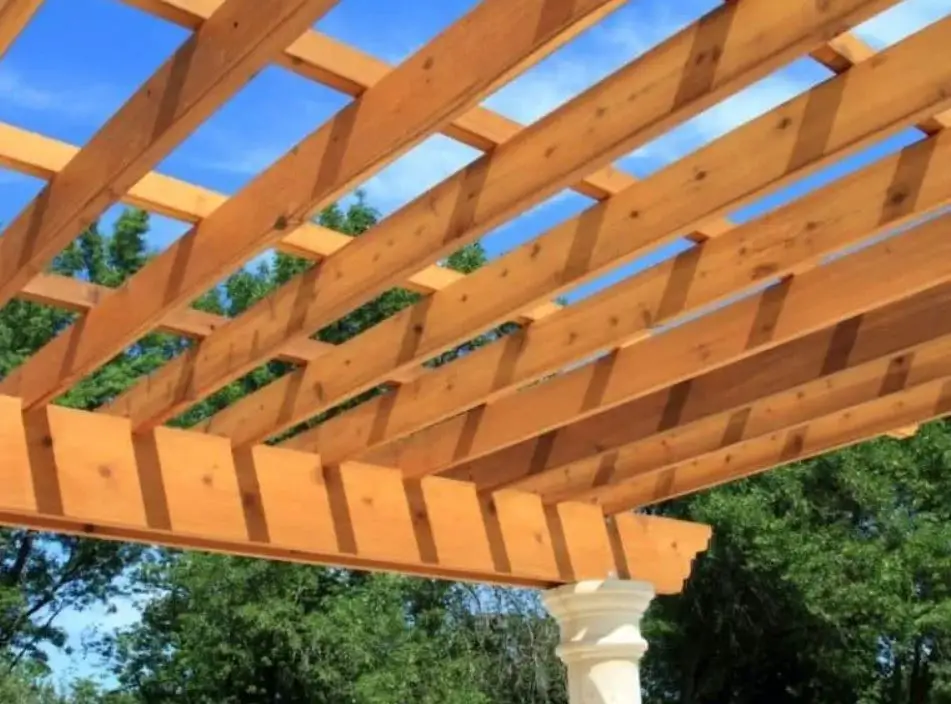
After looking at many different pergolas we have identified a few common problems that keep coming up. Avoiding these will ensure you have a much better experience with your pergola.
Incorrect Material
You want to make sure that you choose the correct material for your specific design. Many things will influence the choice of material including size, location, and budget.
Weather Damage
Weathering is unavoidable when it comes to pergolas, but the damage it does is manageable. Depending on the material you use, you need to care for it and maintain it so that weather damage is minimized.
Problems With Foundation
With a weak foundation, no structure will last. Bad foundations are a common problem that can easily be avoided by following the right process or by contracting an expert.
No Warranty And Support
Another common problem is that people get no warranty or support on their pergolas so when there is an issue they are stuck without any help. This leads to extra costs and extra drama when something goes wrong.
Sizing Errors
Getting the size right is also a tricky task and many people get it wrong. You need a size that is in proportion to your property. Too big and it will take over everything, too small and it will seem out of place.
Pergola vs Arbor – Which Is Better
Arbors are small structures that normally go over a walkway so that you can walk under it. They are good for decor but not for creating gathering spaces.
Arbor Pros and Cons
Pros:
- small and easy to make
- low cost
Cons:
- limited use
- limited space for plants
Pergola vs Trellis – Which Is Better
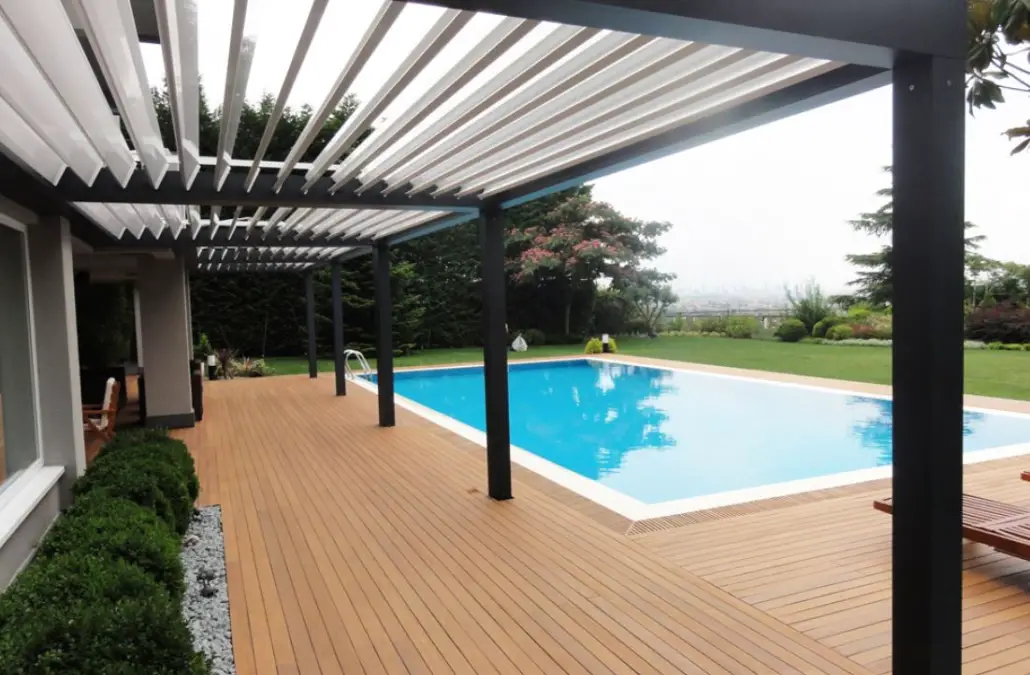
A trellis is a structure that is normally mounted onto a wall for plants to climb up onto it. They are a great garden addition, but they offer no shade or cover for people.
Trellis Pros and Cons
Pros:
- easy to DIY
- good for climbing plants
Cons:
- limited use
- needs a support structure
Pergola vs Pagoda – Which Is Better
Pagodas are larger structures that normally have open walls and a closed roof. They offer more weather protection but cost more to build.
Pagoda Pros and Cons
Pros:
- rain protection
- beautiful designs
Cons:
- Con – expensive
- Con – can be big structures
Pergola vs Pavilion – Which Is Better
Pavilions also come in many different shapes and sizes. They normally stand on 4 or more pillars with a closed roof. They are similar to pergolas except for the closed roof.
Pavilion Pros and Cons
Pros:
- weather protection
- creates a living space
Cons:
- can be expensive
- can be big structures
The Upside Of Pergolas
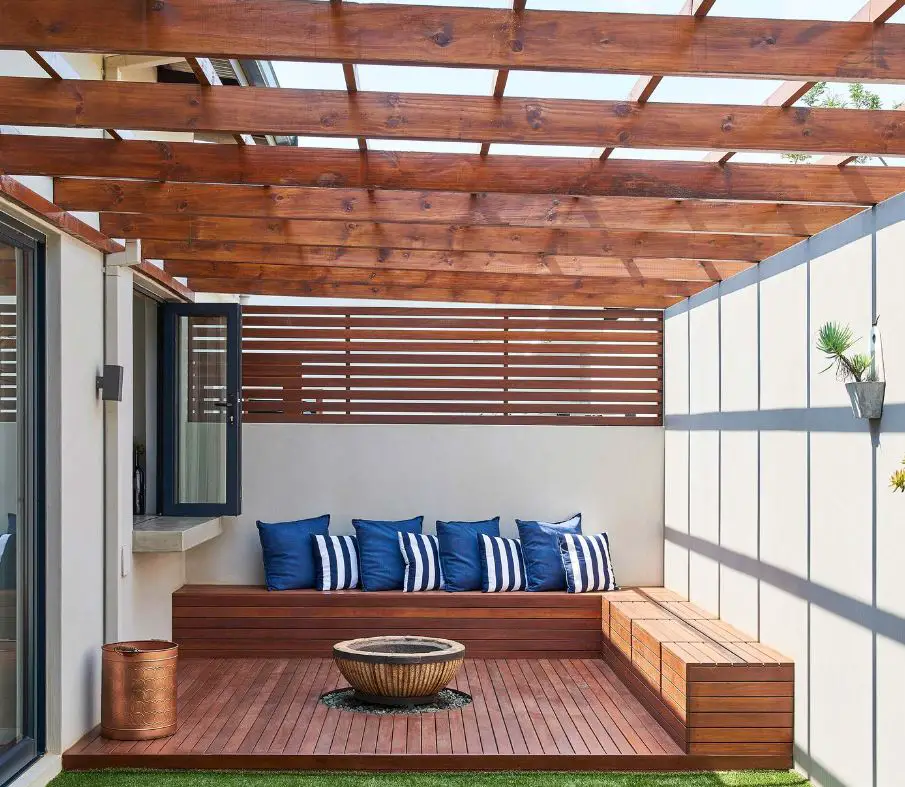
It is not all bad news for pergolas. They are great structures that can add a lot of character and ambience to an outdoor area. Some of the other pros include beautifying your garden, adding a gathering space, and increasing privacy.
Not Overly Expensive
Pergolas can be constructed for a relatively affordable price. Of course, it will depend on what wood you use and how big and fancy the pergola is. Overall, they do not have to break the bank. You can get away with a very well-priced investment if you choose an affordable wood with a simple design and a reasonable contractor.
Add A Gathering Zone To A Garden
Nothing is better than coming together with people. Creating an open-air space in a garden where people can gather is a great idea and it can be used for anything from socializing to education. Pergolas can also create a beautiful atmosphere and it all adds value to people’s experience.
Increases Privacy
Pergolas can offer increased privacy to your space, especially when they are paired with plants that grow up the sides or over the roof. You can also attach fabric to the pergola to create more privacy and protection.
Easy To DIY
One of the best parts about pergolas is that you can easily construct your own. Even if you cannot do it completely yourself, you can easily get a bit of help with the basic structure and then you can personalize and customize it as you want.
For an easy DIY video tutorial, view this video.
Coverings Can Be Changed To Suit Weather
Adding a cover to a pergola adds a lot of additional weather protection. With fabric coverings, you can also roll them up when the weather is good and put them down when the wind and rain start. This offers great versatility so that your pergola can be used in any weather condition.
Suits Plant Life For Beautiful Garden
Pergolas have gained a lot of popularity due to how they are combined into a garden. When you have a pergola outside in the garden it offers a lot of opportunity for plants to grow up the sides and even cover the roof. This creates the most beautiful and atmospheric environment.
Pergola FAQs:
Q: What is the point of having a pergola?
Pergolas can add many benefits to any space or property. They create more protected spaces with people to gather, they are great for growing vines and climbing plants, and they create ambience and beauty.
Q: What is the point of a pergola with no roof?
A pergola without a roof is still great for growing climbing plants like vines. Even without a roof they still have cross beams that offer some sun protection.
Q: Is a pergola worth the money?
Pergolas that are well-designed and well-constructed can definitely add a lot of value to a house. They can also be made quite affordable.
Q: Do you need planning permission for a pergola?
In most cases, you do not need any permission to construct a pergola, but it would depend on case to case. Also, each country and area might have different rules so it is best to consult a local builder about your plans.
Q: Is a pergola cheaper than a roof?
It depends from case to case. Things like the materials used and the size of the structures will influence their prices. In general, pergolas might work out cheaper because they do not have a roof.
Q: How close to the fence can I build a pergola?
Local building codes will dictate exactly what you can and cannot do. For example, you cannot build a pergola that hangs over the fence into your neighbour’s yard. Normally structures need to be a small distance away from property boundaries.
Q: Can I put a roof on my pergola?
You can definitely add a roof to your pergola. If the structure is already built you can even just add a roof. Although, most pergolas are flat at the top so just adding a roof might cause water to gather.
Q: What is the maximum height for a pergola?
The height of a pergola is normally between 2 meters and 3 meters. The exact height is up to you, but too low will be uncomfortable and too high will be impractical and even dangerous.
Q: Should a pergola be attached to the house?
According to Room Impact, pergolas that are attached to the house offer a stronger structure as well as sun protection for that side of the house. In the end, it is up to what you prefer.
Q: Can I use fence posts for the pergola?
Yard Build Bliss agrees that it is possible to use fence posts for the pergola, but you want to make sure the posts are very stable and treated to endure the weather.
Q: Is a pergola a permanent structure?
Pergolas are normally permanent structures because they are built with a lot of heavy wood so the pillars need to be in concrete. There are however smaller pergolas that are designed to be set up and removed.
Q: How close to the house should a pergola be?
It depends on your house and your preference. It can form a part of your house or it can be way out in the garden.
Q: What is the difference between a pergola and a patio cover?
The main difference is that a patio cover has a closed roof and a pergola has an open roof.
Q: How do you secure a pergola to the ground?
There are different methods. The most common is to plant a pole in cement, but you can also anchor it using different methods like cables.
Conclusion
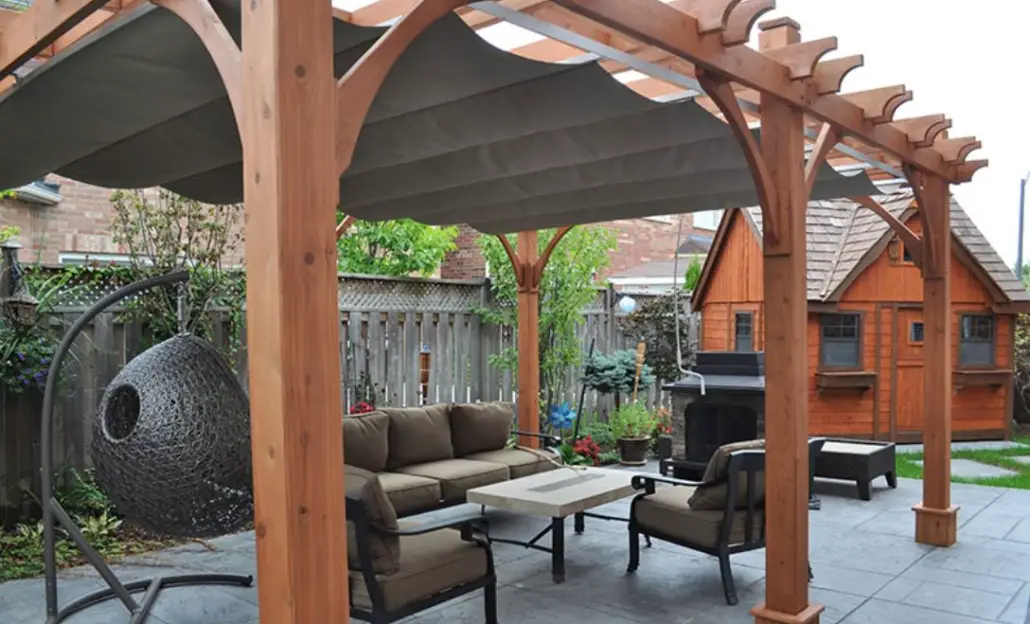
Through this article, we have been looking at all the different aspects of what pergolas are, what their value is, what pros and cons they have, and when to know if it will be worth getting one.
The conclusion that we make is that pergolas are amazing additions to any outdoor area or garden as long as they are properly constructed, properly designed, and well thought through. Knowing about the disadvantages and common problems will help you to avoid making mistakes.
